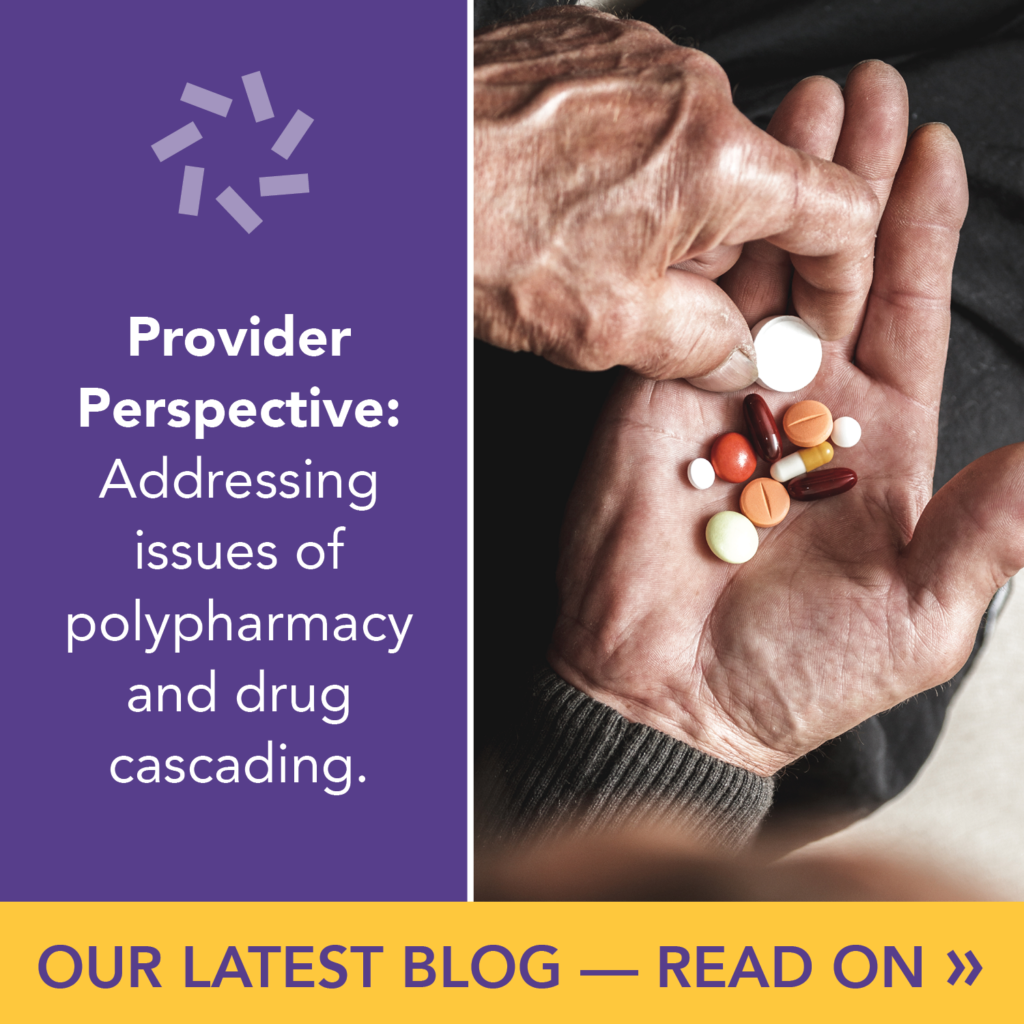
The vision for Lifespark’s model of complete senior health has always included geriatric pharmacology expertise, but as Dr. Nick Schneeman, MD, Chief Medical Officer explained, the company first wanted to focus on the foundational elements of that model—the Life Manager role as the trusted, single point of contact, and the in-home medical expert trained in the nuances of geriatric medicine.
This past summer, Lifespark fulfilled that vision through a new partnership with Consonus Pharmacy. “With the addition of this area of expertise, we’re building our in-house geriatric pharmacology skills,” Dr. Schneeman said. “We want our providers to understand the different classes of medications, how they might interact with each other, and how they tie to individual treatment targets—to think about medications differently from how they were trained in the usual care system.”
Polypharmacy and drug cascading
One of the primary reasons Lifespark is investing in senior-savvy pharmacology is the rise of polypharmacy among older adults. Defined as the simultaneous use of five or more medications, polypharmacy can cause serious adverse events, including dangerous drug interactions, debilitating side effects, increased emergency room visits and hospitalizations, lower quality of life, and a higher risk of mortality.
According to a 2021 National Institutes of Health article on adverse drug reactions, patients aged 65 or older accounted for 25% of ER visits attributed to adverse drug-related events and 49% of events requiring hospitalization.
In a recent interview on WCCO radio’s Health Show, Dr. Schneeman talked about polypharmacy and drug cascading. “Usual care, which is built on a fee-for-service model, gives primary care physicians roughly 15 minutes to spend with a patient—not nearly enough time to review a lengthy list of medications, discuss the risks and benefits of each drug, and consult with the various sub-specialists who prescribed the drugs,” he said.
Appropriately prescribed drugs are not the problem, Dr. Schneeman said. It’s the cascading effect that cause harm. To illustrate, he introduced listeners to “Ella,” not an actual person but a good example of the problem:
“Ella is an 85-year-old woman who lives alone, has very few health problems beyond some mild memory issues, and is active in her community. At her annual checkup, her blood pressure is a little elevated, so her doctor starts her on a medication that has good efficacy but causes some swelling. Her blood pressure comes down, but now she has edema in her ankles. Her doctor refers her to a cardiologist who prescribes a diuretic to treat what might be heart failure. The drug reduces her edema but causes urinary incontinence, so Ella goes to a urologist who puts her on a drug that reduces bladder contractions. It helps, but it makes her profoundly confused and delusional. This concerns Ella’s son who brings her to the hospital where she’s put on an anti-psychotic. In a period of six months, this previously healthy woman goes from no medications to four. Her health plummets and she never recovers.”
While this scenario might sound extreme, Dr. Schneeman said that it happens in clinics and hospitals every day. “No one wakes up in the morning intending to do harm, but we’re all participating in it,” he added.
Support during transitions
Supporting members during transitions is one of the key areas of focus for the Consonus–Lifespark partnership. Transitions, such as hospital to transitional care or a change in health condition, are high-risk periods for medication-related adverse events, said Jackie Guetzko, DNP APRN, CNP, Director, Lifespark Experience Services.
“To minimize that risk, we’ve been embedding referrals to Consonus into our Transitions visits,” she said. “This gives us a great opportunity to actively support people after they’ve experienced an acute event and to prevent future events.”
From Jackie’s perspective, the partnership has been a success for two main reasons. “First, we have another team member evaluating the medication list, and second, the relationship with Consonus has been truly collaborative, with a lot of back-and-forth to ask questions, clarify orders, and gain understanding,” she said.
Based on the success of the Transitions collaboration, Lifespark is now embedding referral orders to Consonus for initial visits as well. “The more we can integrate the referrals, the more we can streamline the start-of-care process, the better it is for our members,” Jackie said.
Eliminating the silos
In the usual care system, Dr. Schneeman explained, pharmacists are typically siloed from practitioners and clients, forcing them to rely on established guidelines rather than provide individualized medication guidance.
“Adding Consonus is not adding another silo—they’re a permanent part of the team,” he said. “At the same time, they don’t own the medication review or the in-depth discussion with the client about the risks and benefits of every drug on their list. That’s still the responsibility of the APP [advanced practice provider], with input from the Life Manager, based on the client’s unique profile and goals of care.”
To learn how the Lifespark model of care supports complete senior health, visit Lifespark.com.


